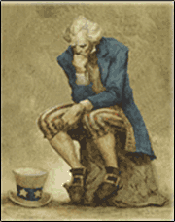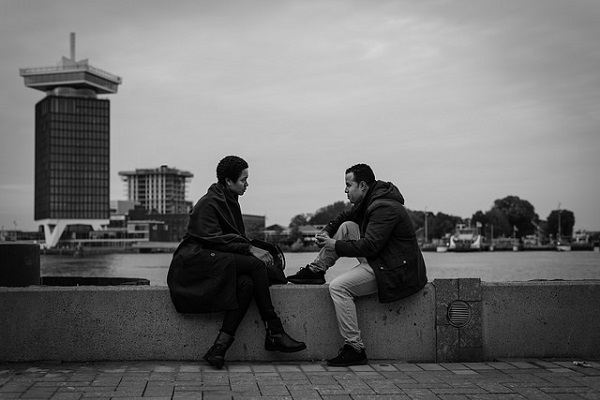
–>
October 8, 2022
Over the last several years, my liberal friends have become less and less comfortable with utilizing classical debating styles — you know, where one person proposes a theory, explains it thoroughly with facts and figures and then responds to any questions about the theory in a logical, rational way. This article develops a theory on why the vast majority of all liberals are currently atrocious debaters.
‘); googletag.cmd.push(function () { googletag.display(‘div-gpt-ad-1609268089992-0’); }); }
My wife and I have been lucky. We have developed many close friendships with lots of people over our lives. Some of these relationships are more recent, but many have lasted 20, 30, or even 40 years. We have over a dozen friends whom we try to stay in close contact with on a regular basis. About half of them are liberal; about half of them are conservative. Virtually no one seems to be dead in the middle anymore.
Recently, a new trend started to become obvious. For my conservative friends, roughly half of all their friends share conservative values, and half are liberal. But our liberal friends tend to have just one or two conservative friends, and they are no longer able to discuss political issues with their conservative friends, since the liberals tend to get too emotional when talking politics.
It is my belief that this inability to discuss political issues is because my liberal friends look only at online sites that share their worldview; they watch only TV news that reinforces their worldview; they discuss politics only with people who share their worldview; and they often look at social media that make them think the liberal view on a topic is the only rational one to have. This isolationism creates an echo chamber, where only one type of ideology is allowed in, and this forces liberals to think of conservatives as caricatures of what conservatives really believe. (Recently, a new acquaintance, a liberal, asked my wife and me if we think all liberals are socialists. This was before we even sat down to have our first drink together. Who does that?)
‘); googletag.cmd.push(function () { googletag.display(‘div-gpt-ad-1609270365559-0’); }); }
This apparent isolationism leads to my theory of what happens in a real debate, where different views are presented. It is called the Pavlovian Liberal Didactic, or PLD. Pavlov first noted that his dogs salivated when his lab assistants came in to feed them. The dogs probably also wagged their tails and shook a bit in anticipation of eating. This conditioned response led Pavlov to many of his theories, some of which make sense. (It is difficult to agree with many of his experiments on humans.)
In debates with liberals, PLD can manifest itself in one of four ways. If a conservative asks a liberal a tough question or makes a comment that is outside a liberal’s worldview, then one of the following three responses occurs (similar to the drooling, tail-wagging, and shaking exhibited by Pavlov’s dogs):
1) The Hide in the Basement Response: This is where the liberal walks away without responding at all. This happened at a recent family party, where my forty-year-old nephew was complaining about Reagan’s AIDS policies. I simply asked him to tell me which policies he specifically disliked. He became agitated and started typing things on his iPhone, clearly trying to find some answer to the question posed. (One might think he should have performed this simple due diligence before making his comments, but I digress.) He was visibly shaking, and it got so bad that his mother (in her 70s) had to usher out the door. In his circles, no one ever questions his logic, since all his friends think exactly like him.
2) The Non-Response Response. This may take one of three forms:
“I am not going to dignify that question with a response.”
The No Answer, Just Sit There Response. (A liberal Ph.D. academic was asked, “What is the independent clause in the 2nd Amendment?) He just sat there, as though he had never taken, or never understood, fifth- or sixth-grade English.
‘); googletag.cmd.push(function () { googletag.display(‘div-gpt-ad-1609268078422-0’); }); } if (publir_show_ads) { document.write(“
The Deflection Response. “Why was the Biden withdrawal from Afghanistan such a complete disaster?” “Trump would have handled it worse.”
3) The Flip Response. This is where the liberal answers a serious question with an absurd response. In another conversation, a liberal was asked, “What does the 10th Amendment cover?” His response: “Everything.” He had no real answer to the question, so he had to make up a ridiculous answer just so I would not press him further. I did anyway.
4) The Willful Ignorance Response. This is where liberals know every single thing about all of the rumors about Trump, including the one with Putin blackmailing him with videos of a Russian prostitute urinating on him, but they know nothing about Hunter Biden’s businesses and potential influence-peddling because they just don’t have the time to follow it.
If pressed further on the substance of their beliefs after they have given several PLD responses, in about 50% of the cases, liberals will then respond by calling the conservative one of the following: racist, misogynist, xenophobe, transphobe, phobe-phobe, anti-science. I have not figured out yet why it happens only roughly half of the time.
Now, the interesting part about all of this is that when liberals give a PLD response, they often think they are being clever. But in reality, they are just providing a conditioned response, and it is not clever at all. As a matter of fact, many of my conservative friends mock the PLD response. We know right then and there that we have won the debate, even if the liberal doesn’t.
The PLD is so ingrained that I can actually explain my theory to a liberal friend, tell him I am going to ask a question that will induce a PLD response, and then ask the question and still get a PLD response. It is difficult for me to keep a straight face when this happens.
It would be great if liberals were not prone to PLD responses. However, that is not the only time they evade rational discussion. When not giving a PLD response, liberals often provide responses filled with emotion; opinion; or “context,” which is really a fancy word for opinion.
We learn more about how others think when good, honest debate occurs over important issues. It also makes us better at understanding and improving our own positions when people having different ideologies from us seriously challenge our beliefs.
I am not optimistic that this pattern will change anytime soon. PLD is too ingrained in liberals’ psyches for it to meaningfully change over the next few years. However, if you watch how liberals respond to questions, PLD may at least provide you with a chuckle along the way.

Image: Thijs Paanakker via Flickr.
<!– if(page_width_onload <= 479) { document.write("
“); googletag.cmd.push(function() { googletag.display(‘div-gpt-ad-1345489840937-4’); }); } –> If you experience technical problems, please write to [email protected]
FOLLOW US ON
<!–
–>
<!– _qoptions={ qacct:”p-9bKF-NgTuSFM6″ }; ![]() –> <!—-> <!– var addthis_share = { email_template: “new_template” } –>
–> <!—-> <!– var addthis_share = { email_template: “new_template” } –>






